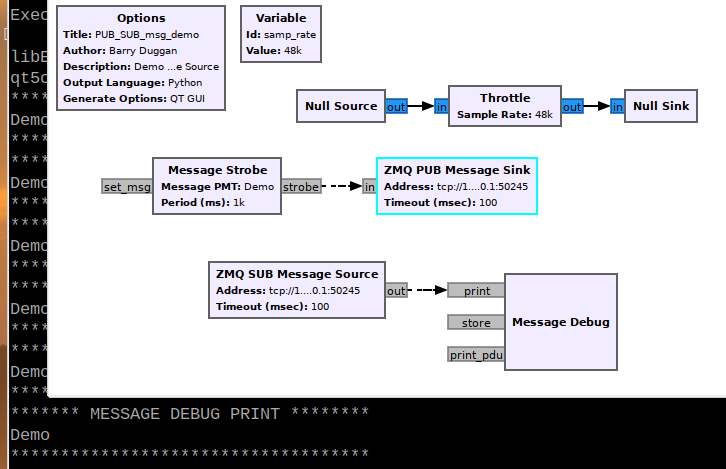Message Debug: Difference between revisions
Jump to navigation
Jump to search
mNo edit summary |
No edit summary |
||
| Line 7: | Line 7: | ||
* print: prints the message directly to standard out. | * print: prints the message directly to standard out. | ||
* store: stores the message in an internal vector. | * store: stores the message in an internal vector. It works in conjunction with a message_debug::get_message(size_t i) call that allows us to retrieve message i afterward. | ||
* print_pdu: specifically designed to handle formatted PDUs (see pdu.h). | * print_pdu: specifically designed to handle formatted PDUs (see pdu.h). It discards messages that aren't PDU pairs (or are null). | ||
== Parameters == | == Parameters == | ||
Revision as of 05:00, 30 December 2021
Debug block for the message passing system.
The message debug block is used to capture and print or store messages as they are received. Any block that generates a message may connect that message port to one or more of the three message input ports of this debug block.
The message ports are:
- print: prints the message directly to standard out.
- store: stores the message in an internal vector. It works in conjunction with a message_debug::get_message(size_t i) call that allows us to retrieve message i afterward.
- print_pdu: specifically designed to handle formatted PDUs (see pdu.h). It discards messages that aren't PDU pairs (or are null).
Parameters
None
Example Flowgraph
In this example, a Message Strobe block sends the string "Demo" once per second. It is displayed on the user terminal by the Message Debug block.
Source Files
- C++ files
- [1]
- Header files
- [2]
- Public header files
- [3]
- Block definition
- [4]
